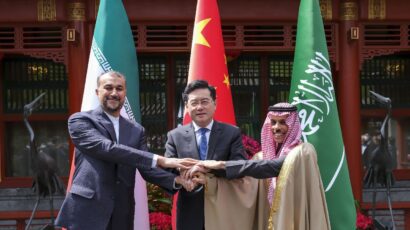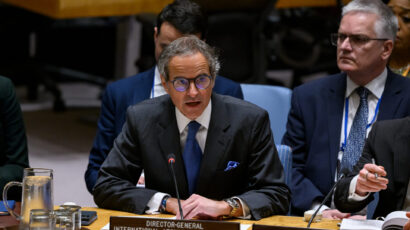The Trident Dispatches No. 3: Tony Blair’s forgetfulness
By Rebecca Johnson | February 26, 2007
Two years ago, in an almost simultaneous policy turnaround, British Prime Minister Tony Blair expressed his determination to develop both a further generation of nuclear weapons and a host of new nuclear power plants–ideally before he left office. Though he made his personal preference (a staunch yes) clear in both cases, he and his government promised open debate and consultations that would involve “the wider public.”
Two years ago, in an almost simultaneous policy turnaround, British Prime Minister Tony Blair expressed his determination to develop both a further generation of nuclear weapons and a host of new nuclear power plants–ideally before he left office. Though he made his personal preference (a staunch yes) clear in both cases, he and his government promised open debate and consultations that would involve "the wider public."
Thus far, however, the process of consultations has been a sham. The government was publicly rebuked for this on February 15, when the High Court in London ruled that the 2006 energy review was "misleading" and "seriously flawed." The court castigated the government for a "consultation document [that] contained no information of any substance on any of the issues identified as being of crucial importance." It concluded that the review was "procedurally unfair" and "wholly insufficient" for groups and people engaging in the consultation "to make an intelligent response." As a consequence of the ruling, the government must go back and conduct an open and genuine consultation and energy review. With his customary arrogance, Blair has dismissed the High Court judgment, saying that it might delay the start of a new nuclear power program, but "would not affect policy."
With a parliamentary vote on Trident scheduled for March, people are asking when the promised consultation on nuclear weapons and security policy will begin. Some are hoping that the lawyers' group Peacerights will mount a similar legal challenge that decision making on Trident is going forward without adequate public debate or consultations. (Greenpeace applied for the judicial review of the government's energy policy.)
On the same day as the High Court ruling, the front page of the Independent carried a petition from a "powerful coalition of 100 scientists, lawyers, church leaders, actors, writers, and MPs" calling for new thinking on Trident. The petition, which MPs and Peers from all parties and the leader of the Liberal Democrats in the House of Commons supported, was short and simple:
- Britain should not rush into a premature decision to replace Trident;
- More time should be taken for parliamentary scrutiny and public debate;
- The urgent need is both to halt the spread of nuclear weapons to new countries, and for all states that possess them to move rapidly and substantially toward nuclear disarmament;
- The government should prioritize a renewed diplomatic initiative to seek a breakthrough in disarmament and nonproliferation negotiations, similar to the lead it has taken in relation to climate change and poverty.
A few days later, the Campaign for Nuclear Disarmament released a statement supported by 53 famous bands and musicians such as Franz Ferdinand and Radiohead's Thom Yorke that called on the government to "choose peace and justice, not nuclear weapons and war." This statement described nuclear weapons as "weapons of mass destruction which can kill hundreds of millions of people. They cannot protect us from today's security threats such as terrorism and climate change."
Meanwhile, International Atomic Energy Agency (IAEA) Director-General Mohamed ElBaradei commented in an interview with the Financial Times that Blair's plans for Trident "set a bad example." Although the interview focused mainly on concerns about Iran's nuclear program, ElBaradei added, "When you see here in the U.K. the program for modernizing Trident, which basically gets the U.K. far into thetwenty-first century with a nuclear deterrent, it is difficult then for us to turn around and tell everybody else that nuclear deterrents are really no good for you."
Asked about ElBaradei's comments by Labour MP Chris Mullin, Blair was dismissive, saying that the Nuclear Non-Proliferation Treaty (NPT) "gives Britain the right to possess nuclear weapons." He added, "As Mohamed ElBaradei is the custodian of that treaty's implementation, I think it would be a good idea for him to act accordingly."
But it is Blair who is mistaken, for the NPT confers no such right. The treaty, which entered into force in 1970, identifies five nuclear weapon states–Britain, China, France, the Soviet Union, and United States–as having conducted a nuclear test by January 1, 1967. The NPT then provides the appropriate obligations: Those countries without nuclear weapons in 1967 should not seek such weapons (Article II), and they should place any nuclear energy facilities under IAEA safeguards (Article III); meanwhile, the five nuclear weapon states promise not to transfer their nuclear weapons or technologies (Article I) and to engage in good faith negotiations to disarm (Article VI).
Blair's choice of the term "right" in relation to Britain's possession of nuclear weapons was not only wrong, but embarrassingly maladroit and counterproductive. The sole reference to a "right" in the NPT is the "inalienable right" to nuclear energy for peaceful purposes in Article IV, which Iran constantly evokes to justify its refusal to suspend uranium enrichment. Article IV, inserted as an incentive into the NPT at a time when nuclear technology appeared to promise cheap, safe, and clean energy, has increasingly become perceived as a major barrier to effective nonproliferation.
Article IV does not mention either the enrichment of uranium or the separation of plutonium–the technologies that lead most directly to nuclear weapon capabilities. The international community is doing its utmost to uphold the general principle that renouncing nuclear weapons should not place countries at a disadvantage in terms of security or energy and technological development for peaceful purposes. Given the importance of limiting Iran's view of the "rights" conferred by the NPT, Blair's suggestion that the NPT contains a right for the defined nuclear weapon states to retain or develop nuclear weapons was ill-judged.
On the contrary, Article VI makes disarmament an indispensable part of the nonproliferation equation. And for good reason: Few governments will renounce their nuclear weapons if they believed other countries will keep the weapons indefinitely. This was presumably the point ElBaradei made when he called Trident renewal a "bad example." As several international lawyers have concluded, Blair's push to get a further generation of nuclear weapons violates the spirit–and arguably, the letter–of the NPT.
The original text of Article VI may have been woolly, but when the NPT was indefinitely extended in 1995, the non-nuclear weapon states began a process intended to reinforce this obligation by insisting that objectives for nonproliferation and disarmament be adopted simultaneously with an agreement to strengthen the NPT's implementation. In 1996, the International Court of Justice unanimously agreed: "There exists an obligation to pursue in good faith and bring to a conclusion negotiations leading to nuclear disarmament in all its aspects under strict and effective international control."
This decision is clearly drawn from Article VI, but the court's opinion underscores the limit on the apparent open-endedness of Article VI's obligations and provides additional legal force and urgency–first by emphasizing that to negotiate in "good faith" implies bringing the negotiations to conclusion, and second, that nuclear disarmament does not have to wait until the world rids itself of every last tank or gun (what the NPT calls "general and complete disarmament"). Clearly, the NPT obligation is not simply nuclear reductions, but "nuclear disarmament in all its aspects."
To adopt this understanding more clearly into the NPT process, states parties to the treaty unanimously reaffirmed the court's interpretation of Article VI and clarified their expectations in the final document of the 2000 NPT Review Conference. As part of this agreement, all five nuclear weapon states made an "unequivocal undertaking . . . to accomplish the total elimination of their nuclear arsenals," and committed themselves to a program of "practical steps for the systematic and progressive efforts to implement Article VI." Some steps were given a target date; others were not. Nowhere in the NPT or any supporting documents or agreements does it state or imply that the weapon states have a "right" to keep modernizing their nuclear arsenals with impunity or in perpetuity.
So Blair owes ElBaradei an apology. The IAEA director clearly understands the NPT; Blair, on the other hand, appears to have suffered both a fit of ignorance and forgetfulness. For Blair's first government has taken considerable public credit for playing a leading role in negotiating "13 Disarmament Steps" in 2000 that included the "unequivocal undertaking" to eliminate the nuclear arsenals. Britain is also a custodian of the NPT and–like ElBaradei–needs to act accordingly.
Together, we make the world safer.
The Bulletin elevates expert voices above the noise. But as an independent nonprofit organization, our operations depend on the support of readers like you. Help us continue to deliver quality journalism that holds leaders accountable. Your support of our work at any level is important. In return, we promise our coverage will be understandable, influential, vigilant, solution-oriented, and fair-minded. Together we can make a difference.
Topics: Nuclear Weapons















